|
continued...
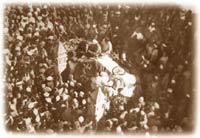 Well,
that was what Gandhi said. Isn't that beautiful? All the people
I have shared this text with are unanimous that Gandhi's Message
is simple, direct, most effective, and highly relevant to
the present time, even more than it was seventy years ago
when it was first delivered. Well,
that was what Gandhi said. Isn't that beautiful? All the people
I have shared this text with are unanimous that Gandhi's Message
is simple, direct, most effective, and highly relevant to
the present time, even more than it was seventy years ago
when it was first delivered.
Public perception about Gandhi has gone round a full circle.
When he was alive, he was revered. Later, people began to
slowly forget him, besides dismissing his various ideas as
fads. But now, slowly the realisation is beginning to dawn
that Gandhi was in fact far ahead of his times.
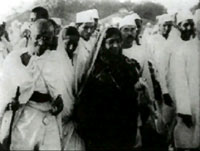 Let
me explain all this. But first, I should perhaps draw attention
to certain facets of his personality. Gandhi was a highly
disciplined person, totally against wastage, of time, money
and paper, in particular. Where paper was concerned, he would,
for example, preserve little bits of paper to write notes
on. Where money was concerned, he always travelled third class
in train. And where time was concerned, he had a famous pocket
watch tucked into his waist that he frequently consulted.
Ten days before he was assassinated there was a bomb attack
in the prayer meeting that he invariably addressed in the
evening. This bomb attack took place in Delhi where Gandhi
was at that time. In the confusion that followed, Gandhi lost
his watch. When this became known, a famous watch company
immediately gifted him another watch. In fact on that fatal
30th January, 1948, when Gandhi came out for his usual evening
prayer meeting, he was about five minutes late, and he was
commenting on that even as the assassin pumped bullets into
him. Let
me explain all this. But first, I should perhaps draw attention
to certain facets of his personality. Gandhi was a highly
disciplined person, totally against wastage, of time, money
and paper, in particular. Where paper was concerned, he would,
for example, preserve little bits of paper to write notes
on. Where money was concerned, he always travelled third class
in train. And where time was concerned, he had a famous pocket
watch tucked into his waist that he frequently consulted.
Ten days before he was assassinated there was a bomb attack
in the prayer meeting that he invariably addressed in the
evening. This bomb attack took place in Delhi where Gandhi
was at that time. In the confusion that followed, Gandhi lost
his watch. When this became known, a famous watch company
immediately gifted him another watch. In fact on that fatal
30th January, 1948, when Gandhi came out for his usual evening
prayer meeting, he was about five minutes late, and he was
commenting on that even as the assassin pumped bullets into
him.
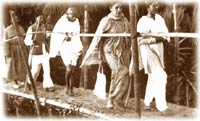 This
brings me to the next important point that I wish to make.
In the Gita, Krishna says that man must leave his mortal coil
with the name of the Lord on his lips. And that precisely
is what Gandhi did. He fell down saying "He Ram"
twice. Gandhi was a great one for Namasmarana that Swami recommends
to us so often. With Gandhi, chanting the name of the Lord
was almost an obsession. Stressing how firmly he was committed
to Namasmarana, Gandhi once declared, "My breath may
stop, but my chanting will not." This
brings me to the next important point that I wish to make.
In the Gita, Krishna says that man must leave his mortal coil
with the name of the Lord on his lips. And that precisely
is what Gandhi did. He fell down saying "He Ram"
twice. Gandhi was a great one for Namasmarana that Swami recommends
to us so often. With Gandhi, chanting the name of the Lord
was almost an obsession. Stressing how firmly he was committed
to Namasmarana, Gandhi once declared, "My breath may
stop, but my chanting will not."
Swami often says, "Follow the Master. Your Conscience
is the Master." That precisely is what Gandhi did all
the time. An example. In the early thirties of the twentieth
century when Gandhi started the famous Satyagraha or Non-Co-operation
movement, he envisaged it as a totally non-violent struggle.
But within days of the start of Satyagraha, some extremist
elements participating in the freedom struggle attacked a
Police Station in Chauri Chaura, torched the building, and
burnt alive many Policemen. Gandhi was very much upset by
this incident. He immediately called off the struggle, went
on a fast for self-atonement - Gandhi often did this - and
declared that he had committed a Himalayan blunder in ordering
that particular campaign. The phrase Himalayan blunder thereafter
became a part of the Indian lexicon.
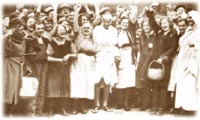 Gandhi
can be remembered for any number of things. After reading
the Gita, I will always remember Gandhi for actually spiritualising
life, every moment of it. What is remarkable is that though
Gandhi was immersed in a political struggle to liberate India,
even that political struggle became a spiritual journey for
him. Let me give a few examples. Gandhi
can be remembered for any number of things. After reading
the Gita, I will always remember Gandhi for actually spiritualising
life, every moment of it. What is remarkable is that though
Gandhi was immersed in a political struggle to liberate India,
even that political struggle became a spiritual journey for
him. Let me give a few examples.
At one time, Gandhi decided to agitate against the punitive
salt tax imposed by the British, which caused great hardship
to the poor. He then launched what has since come to be known
as the Salt Satyagraha. He asked people living all over India,
especially those close to the coastal regions, to march to
the sea shore, collect some sea water, evaporate it and make
salt. This was to be the sign of protest and the declaration
that when God had gifted the sea, man had no right to levy
punitive taxes and amass wealth. So, protest marches to the
sea-shore were organised all over the long coast line of India
on a particular day, and Gandhi himself prepared to lead one
such march from the village of Dandi in Gujarat. This event
has since come to be known as the Dandi March.
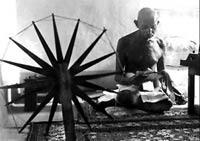 At
the beginning of the Dandi March, Gandhi addressed the marchers
and in that speech he drew pointed attention to the importance
of the means as well as the end. These days, many people try
to justify illegal and even immoral actions on the ground
that the end objective is good. Gandhi correctly held that
the means are as important as the end and that BOTH must be
good. To emphasise this, he quoted the last Sloka of the Gita,
comparing Krishna to the Pure End, and Arjuna to the sacred
means. Gandhi declared that the Gita says where Krishna and
Arjuna are both present there would be victory. In practical
terms this means that the means as well as the end must both
be good - not for him the cliché that all is fair in
love and war. At
the beginning of the Dandi March, Gandhi addressed the marchers
and in that speech he drew pointed attention to the importance
of the means as well as the end. These days, many people try
to justify illegal and even immoral actions on the ground
that the end objective is good. Gandhi correctly held that
the means are as important as the end and that BOTH must be
good. To emphasise this, he quoted the last Sloka of the Gita,
comparing Krishna to the Pure End, and Arjuna to the sacred
means. Gandhi declared that the Gita says where Krishna and
Arjuna are both present there would be victory. In practical
terms this means that the means as well as the end must both
be good - not for him the cliché that all is fair in
love and war.
Gandhi was always meticulous in his observance of Dharma,
even in political matters. As we all know, British India was
partitioned into Pakistan and India in August 1947. Everything
had then to be divided between the two countries, starting
from the Army to the railway and the cash in the Reserve Bank.
It so happened, that India had to pay to Pakistan 550 million
rupees - that was a lot of money in those days. But before
this money could be transferred, there was so much trouble
between Pakistan and India that the Government of India decided
to withhold transfer of this money. Gandhi was of course not
in the Government, but he publicly declared that it was wrong
on the part of India to hold back what belonged to Pakistan,
no matter what the differences. Gandhi was severely criticised
for his views, but he stuck to his guns, defending himself
by citing Dharma.
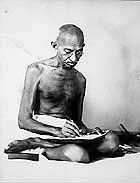 This
brings me to Gandhi and Independence. Gandhi always wanted
unity and strongly voiced it. But the forces of separation
grew stronger and stronger, day by day. Eventually he had
to resign himself to the partition of the country. Thus, on
August 14th 1947, Pakistan was born and on the following day
India became free from British rule. There were violent riots
all over North India preceding this historic day - in fact
violence continued even after, for quite some time. Anyway,
on 15th August, people all over India rejoiced in celebration
of the moment they had waited for, for nearly a hundred years
in fact. But Gandhi was no where near the festivities. He
was in Noahkali in rural Bengal, the scene of violent atrocities.
Gandhi who was then well past seventy, walked on the fields
from village to village to comfort the grieving ones. I still
remember vividly the photos from that time, showing Gandhi
walking across the fields. This
brings me to Gandhi and Independence. Gandhi always wanted
unity and strongly voiced it. But the forces of separation
grew stronger and stronger, day by day. Eventually he had
to resign himself to the partition of the country. Thus, on
August 14th 1947, Pakistan was born and on the following day
India became free from British rule. There were violent riots
all over North India preceding this historic day - in fact
violence continued even after, for quite some time. Anyway,
on 15th August, people all over India rejoiced in celebration
of the moment they had waited for, for nearly a hundred years
in fact. But Gandhi was no where near the festivities. He
was in Noahkali in rural Bengal, the scene of violent atrocities.
Gandhi who was then well past seventy, walked on the fields
from village to village to comfort the grieving ones. I still
remember vividly the photos from that time, showing Gandhi
walking across the fields.
I do not want to give you the impression that Gandhi was
just a great Dharmic politician. Rather, he was one who showed
how the Gita could be applied even in politics. For him, God
and spirituality came first; the world was a mere platform
to show his love for God.
Gandhi realised quite early that a true spiritual seeker
must avidly practice sense and Mind control, which Bhagavan
Baba draws our attention to so often. He led a much disciplined
life, and also an extremely spartan one. As I told you earlier,
he was very particular about time. Once he gave an interview
to an American correspondent. The American arrived on the
dot. Gandhi welcomed him into the hut where he lived, and
with a smile asked the correspondent to sit on the floor -
there were no chairs. It was a bit uncomfortable but the correspondent
sat down. Gandhi was spinning on the charka as he often used
to, while the America sat transfixed, lost in the aura that
surrounded Gandhi's gentle face. Five minutes passed and the
correspondent had not asked a single question thought he had
come with many. Gandhi glanced at his pocket watch that was
by his side, smiled and said, "You know, five minutes
of your time is already over and you have not begun the interview
yet!"
The Gita says that one should not hate anybody. Gandhi meticulously
followed this injunction of the Lord. He always asserted that
his quarrel was with only British Imperialism and not the
British people. Thus, for example, when he went to England
for the Round Table Conference, he made a special trip to
Lancashire to address the mill workers there. What for? There
is an interesting story behind this visit.
Everyone knows that the average Indian wears a dhothi. In
the old days, the dhothi used to be made in India by Indian
weavers using the yarn produced by villagers. When the British
started ruling India, they saw a huge market for the sale
of dhothis. Thus, many mills sprang up all over Lancashire
to make dhothis for sale in India. Thanks to the finer quality
and aggressive marketing, literally millions of Indians lost
their livelihood till Gandhi came and launched a strong movement
urging people to buy only Indian-made dhothis. It was now
the turn of the British textile industry to go out of business
and the mill workers of Lancashire who became jobless began
to hate Gandhi. That is why Gandhi made a special point of
visiting Lancashire and explaining the correct facts to the
mill workers so that they understood that Gandhi did not hate
them or have anything personal against them.
Incidentally, when the present Queen of England got married
in 1947 [or was it 1946? I don't exactly remember], Gandhi
sent her a wedding gift, a table cloth made out yarn he had
personally spun. No wonder there was always a natural admiration
for Gandhi amongst the intellectuals even though they sometimes
disagreed with him. Thus, for example, when Gandhi once appeared
in a court to be tried for sedition before a British Judge,
the Judge spontaneously rose in his seat when prisoner Gandhi
was brought in! Imagine that!! A Judge getting up to show
respect to a prisoner. This is a true incident, beautifully
captured in the famous film on Gandhi by Attenborough.
Gandhi can be remembered for many things. But I personally
believe, he should be remembered for his devotion to God.
About his unshakeable faith in God, he said that even if the
whole of humanity rallied against him, asking him not to believe
in God, he would not flinch. Such was his faith.
Gandhi strongly believed in ceiling on desires, which Swami
so often commends to us. Thus Gandhi declared that the Earth
has enough to meet the needs of the entire population, but
not enough to satisfy the greed of just one man! In those
days when Gandhi said this, people laughed. But now, with
the concern for the environment etc., people are beginning
to realise that Gandhi's model for sustainable development
had much merit in it.
Gandhi was not born a Mahatma; for many years he was just
like most of us. But one fine day, he resolved firmly that
he would be wedded to Truth. And that was the turning point.
That is why he titled his autobiography as MY EXPERIMENTS
WITH TRUTH.
If there is one lesson to be learnt from the life of Gandhi,
I would say it is one-pointedness. For Gandhi, the twin objectives
in life were Sathya and Dharma. Everything else was secondary,
even the Independence of India for which he struggled so much.
JAI SAI RAM.
|